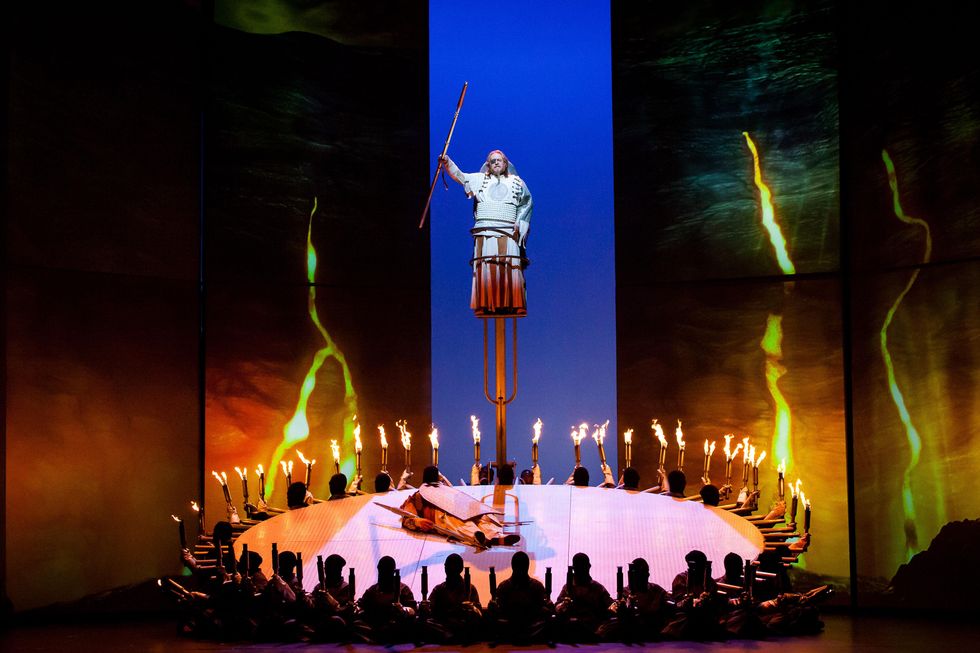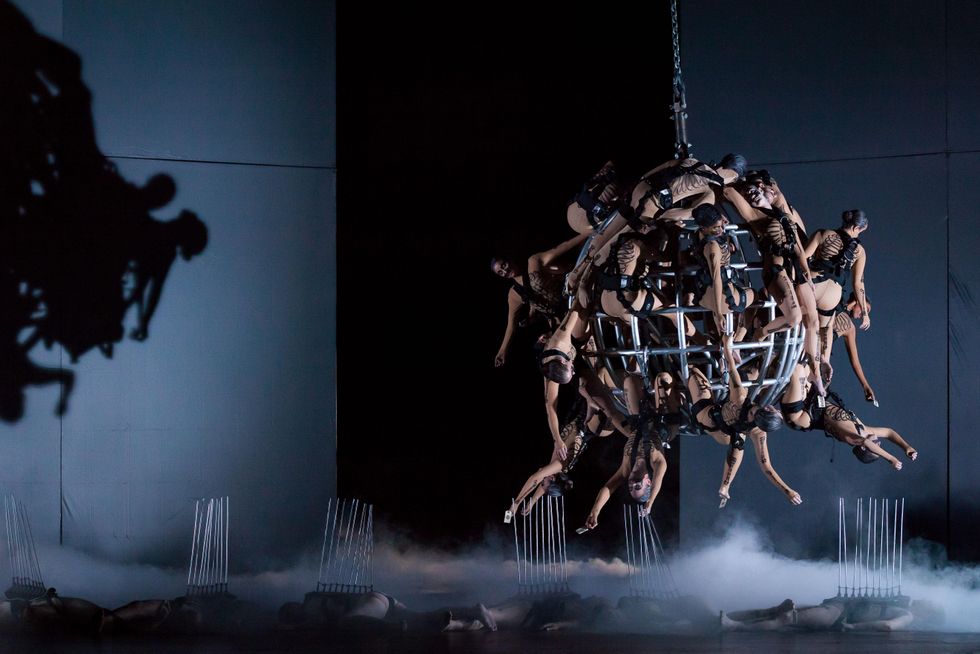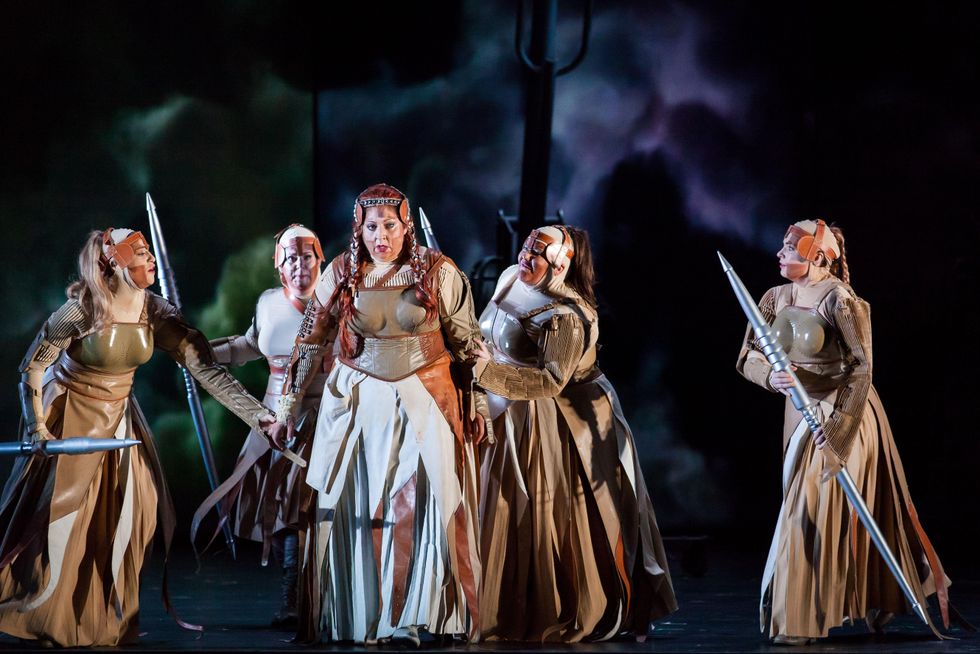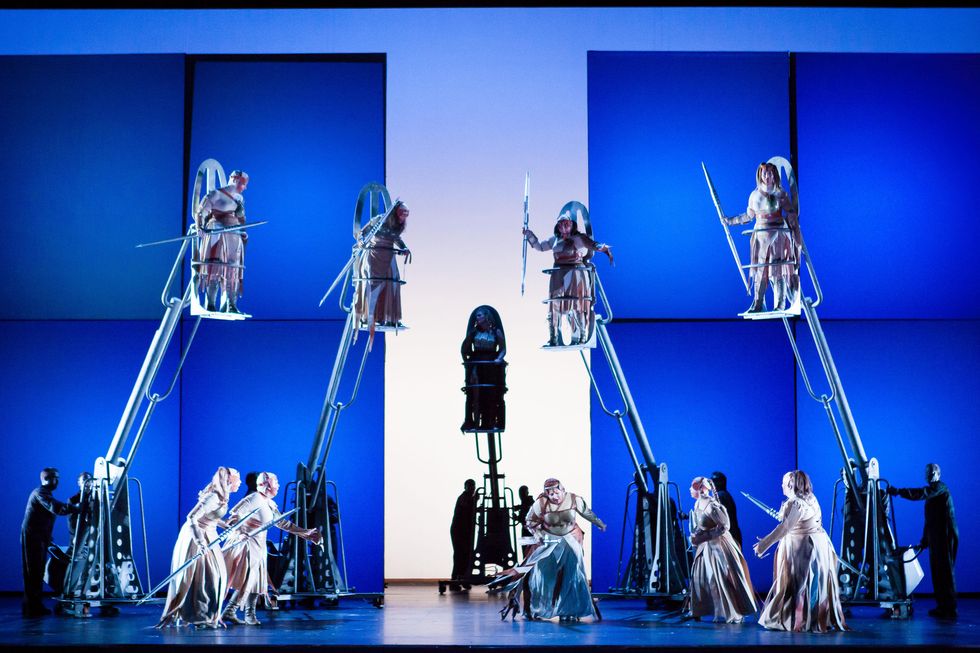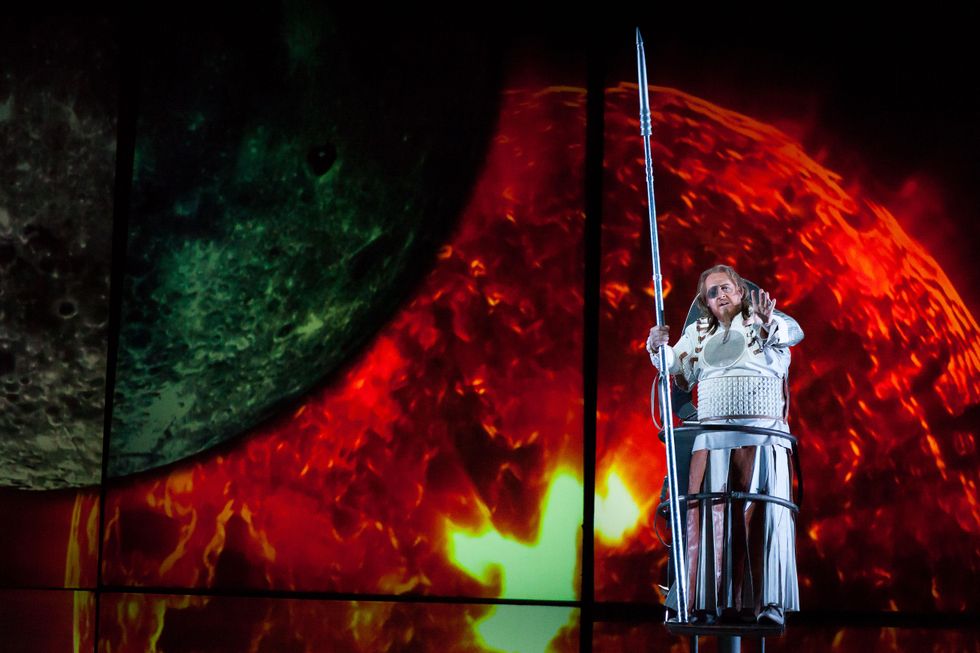The Review Is In
Love is a burning thing: Fascinating Die Walküre heralds opera of the future
Here in Houston, I know a brilliant woman who said, “The worst failures are always those of the imagination.” I thought about my well-spoken friend during the second act of Houston Grand Opera’s Die Walküre, especially when Wotan accuses his wife Fricka of not really being able to look ahead.
“Age-old custom is all you can grasp,” he says in disgust, “but my thoughts seek to encompass what’s never yet come to pass.”
Always ready to one-up each other with stormy sermons, it’s no wonder that English-Canadian singer and comedian Anna Russell labeled Wotan “a crashing bore” in one of her hilarious stage routines. Bass-Baritone Iain Paterson brings enormous depth to this role, however, with a strong and resonant voice and convincing acting throughout the second and third acts. It’s more of the great talent he demonstrated in the same role during HGO’s Das Rheingold last season. At certain moments, however, he was a bit swallowed up by the orchestra’s volume, though I feel this was more the result of conductor Patrick Summers’ often heavy hand than of any vocal insufficiency in Paterson.
I am even more excited by the second installment in this peculiar, fascinating and deeply-imaginative Barcelona-based La Fura dels Baus production.
The potential of imagination, of course, is a central theme in this second opera in Wagner’s cycle (or, the first, if you accept Wagner’s concept of Das Rheingold as a prologue or “vorabend” performance to the subsequent three operas). If you have been following my reviews, you know already that I adored last year’s Rheingold and that I found the singing exceptional in every respect.
I am even more excited by the second installment in this peculiar, fascinating and deeply-imaginative Barcelona-based La Fura dels Baus production. It is, in the words of Wotan, a sublime example of “what’s never yet come to pass,” for me, the opera of the future.
Perhaps the only shortcomings I can identify in this Walküre are Chu Uroz’s costume designs for Siegmund, Sieglinde, and Hunding. In the particular case of Sieglinde, Uroz gave her a dismal cave-frock that looks like what Rei Kawakubo might come up with for an imaginary make-over of Wilma Flintstone. These were small problems, however, since the singing was so stellar.
Minor shortcomings
Karita Mattila, an artist I have admired deeply since her appearance as Leonore/Fidelio in HGO’s 2011 Fidelio, is a formidable Sieglinde, even if her voice was hoarse at moments. It was occasional and momentary, as if she might have been fighting allergies or a cold. Maybe it was because director Carlus Padrissa presented her held on Hunding’s leash or otherwise walking on her haunches throughout the entire first act, another minor shortcoming. For the love of the Valhalla gods, let her stand up properly to sing! Long gone are the days when true divas would have refused such ridiculous stage direction, and I hope Mattila comes to her senses before the run finishes.
The news, albeit without surprise, is Christine Goerke as Brünhilde. She is a great artist who is clearly poised in front of the new generation of commanding Wagnerian singers.
The news, albeit without surprise, is Christine Goerke as Brünhilde. She is a great artist who is clearly poised in front of the new generation of commanding Wagnerian singers. The role of Brünhilde is, of course, the very valkyrie of the opera’s title, and Goerke played it with a sophisticated blend of vocal confidence and youthful optimism. Is there a weirder role in all of Wagner?
After spending a few hours trying to anticipate and then satisfy her father’s complicated demands, not to mention those of her insistent eight sisters, her reward is to be confined to endless sleep on a mountain top, prey for the first man who discovers her plight. One would think that Brünhilde would try to escape such a fate. Instead, she seems engrossed by the sentence, and begs her father to encircle her sleeping figure with a ring of fire. “Let its searing flames encircle the fell,” she begs, “its tongue shall lick, its tooth consume the coward who dares to draw near.”
All of the singers in this cast are strong, making for a steady and powerful ensemble. Jamie Barton helps the god Fricka really come across as an unyielding upholder of marriage, her voice clear and her diction spit-fire perfect. Simon O’Neill is a passionate and irrefutable Siegmund, especially when he is wrestling the sword from the ash tree, and Ain Anger, a stunning bass from Estonia (you might remember him as Ramfis in HGO’s 2013 Aïda) was a thunderous if not terrifying Hunding.
The orchestra still has problems noticed in last season’s Das Rheingold, namely in the brass section, where intonation is lacking. Who to blame for all those flat trumpet solos? Principal Jim Vassallo, or maestro Summers? It’s a leitmotif-filled opera, and many of those themes come from the horns, trumpets, and trombones. Last year I called this a blemish, this year it’s a significant, if festering, irritation.
Stunning finale
Summers approaches this score with gusto, to say the least, but it’s a little bit like listening to the imaginary radio station WGNR, where it’s “all Wagner! All the time!” And, unfortunately, almost always loud. This is wonderful when the valkyries are riding their horses across the rock cliff and ho-yo-to-ho-ing away. But Summers could have showed us greater clarity and elegance in the opera’s quieter moments, in particular, the second act Annunciation of Death Scene.
He did, however, bring us a thoroughly stunning finale, as Wotan called upon Loge to encircle his sleeping favorite valkyrie daughter in fire. Loge’s leitmotif shimmered in what must be one of the most sublime moments I’ve witnessed from Houston Grand Opera. The brass fell into place, the harps undulated, and it was a vast and remarkable moment in the Wortham Theater.
Wagner’s stage direction here calls for “a stream of fire” that come from within the rock, “gradually increasing in intensity until it becomes a brilliant fiery glow.” Supernumeraries holding torches transferred the flame one to the other until the ring was complete.
Wotan picked up his spear and wandered off, forlorn, and I understood, finally, what had been stirring in Brünhilde’s vibrant imagination.
-----------------------
Remaining performances of Die Walküre are April 25, April 30 and May 3.
